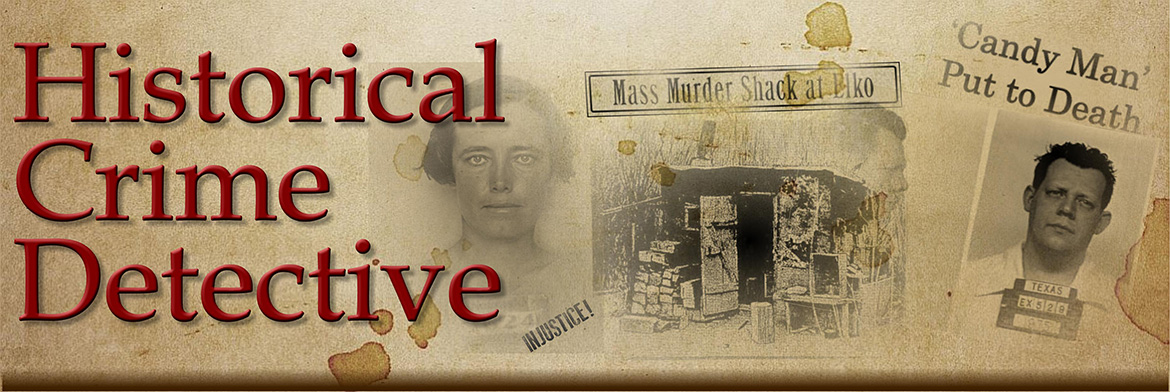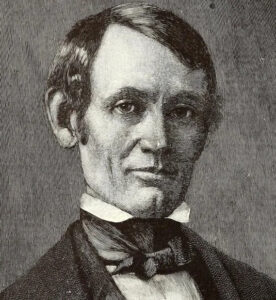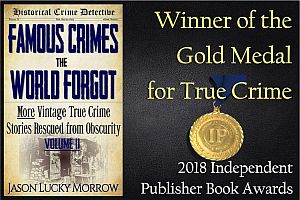Abraham Lincoln wrote a True Crime Story, and it was Good!
Home | Feature Stories | Abraham Lincoln wrote a True Crime Story, and it was Good!For a few short weeks during June 1841, residents of Springfield, Illinois, were caught up in the mass hysteria of a sensational murder case that had all the elements of an Edgar Allan Poe murder mystery. Three strangers from out of town arrive in Springfield, but one of them soon goes missing. Wild rumors abound and soon two of the men and their local brother are accused of murder. The motive, $1,500 in gold coins stolen from the dead man who is yet to be found. One brother turns against the other two and agrees to testify as a witness for the prosecution. More sensation-loving witnesses come forward to testify against the two brothers who can already feel the noose around their neck.
Their defense attorney was a thirty-two year-old future president of the United States who flips the script with a Perry Mason plot twist so outrageous, everybody just wanted to go home and forget it ever happened.
Everyone, that is, except attorney turned true crime author Abraham Lincoln. A week after the trial, he wrote about the events in a June 19 letter to his friend, Joshua Speed. In 1846, he wrote the following version for the Quincy Whig newspaper, now the Quincy-Herald Whig. It was later republished in the March 1952 issue of Ellery Queen’s Mystery Magazine.
Note: Dates in parenthesis are by the HCD Editor. To the best of my knowledge, they are accurate.
# # #
The Trailor Murder Mystery, 1841
by Abraham Lincoln, Esq.
In the year 1841, there resided, at different points in the State of Illinois, three brothers by the name of Trailor. Their Christian names were William, Henry, and Archibald.
Archibald lived in Springfield, the state capitol (where Lincoln practiced law at the time). He was a sober, retiring, and industrious man, of about thirty years of age; a carpenter by trade, and a bachelor, boarding with his partner in business—a Mr. Myers.
Henry, a year or two older, was a similar man of industrious habits. He had a family, and they lived a farm at Clary’s Grove, about twenty miles northwest of Springfield.
William, still older, resided on a farm in Warren County, situated more than 100-miles northwest of Springfield. He was a widower, with several children.
In the neighborhood of William’s residence, there was a man by the name of (Archie) Fisher, who was somewhat above the age of fifty; had no family, and no settled home; but who boarded and lodged a while here and a while there, with persons for whom he did little jobs of work. His habits were remarkably economical, so that an impression got about that he had accumulated a considerable amount of money.
In the latter part of May 1841, William formed the purpose of visiting his brothers at Clary’s Grove and Springfield; and Fisher, at the time having his temporary residence at William’s house, resolved to accompany him.
They set out together in a buggy with a single horse. On Sunday evening (May 30), they reached Henry’s residence, and stayed overnight. On Monday morning (May 31), they started on to Springfield, Henry accompanying them on horseback. They reached town about noon, met Archibald, went with him to his boarding house, and there took up their lodgings for the time they should remain.
After lunch, the three Trailors and Fisher left the boarding house in company, for the avowed purpose of spending the evening together in looking about the town.
At supper, the Trailors had all returned, but Fisher was missing, and some inquiry was made about him. After supper, the Trailors went out professedly in search of him. One by one they returned, the last coming in after late tea time, and each stating that he had been unable to discover anything of Fisher.
The next day (Tuesday, June 1), both before and after breakfast, they went professedly in search again, and returned at noon, still unsuccessful. Dinner (lunch) again being had, William and Henry expressed a determination to give up the search, and start for their homes. This was remonstrated against by some of the boarders about the house, on the ground that Fisher was somewhere in the vicinity, and would be left without any conveyance, as he and William had come in the same buggy. The remonstrance was disregarded, and they departed for their homes respectively.
Up to this time, the knowledge of Fisher’s mysterious disappearance had spread very little beyond the few boarders at Myers’, and excited no considerable interest. After the lapse of three or four days, Henry returned to Springfield, for the ostensible purpose of makings further search for Fisher. Procuring some of the boarders, he, together with them and Archibald, spent another day in ineffectual search, when it was again abandoned, and he returned home.
No general interest was yet excited.
On the Friday, week after Fisher’s disappearance (June 4?), the Postmaster at Springfield received a letter from the Postmaster nearest William’s residence in Warren County, stating that William had returned home without Fisher, and was saying, rather boastfully, that Fisher was dead, and had willed him his money, and that he had got about fifteen hundred dollars by it. The letter further stated that William’s story and conduct seemed strange, and desired the Postmaster at Springfield to ascertain and record what was the truth in the matter.
The postmaster at Springfield made the letter public and at once, excitement became universal and intense. Springfield, at that time, had a population of about 3,500, with a city organization. The attorney general of the state resided there. A purpose was forthwith formed to ferret out the mystery, in putting which into execution, the mayor of the city and the attorney general took the lead. To make search for, and, if possible, find the body of the man supposed to be murdered, was resolved on as the first step.
In pursuance of this, men were formed into large parties, and marched abreast, in all directions, so as to let no inch of ground in the vicinity remain unsearched. Examinations were made of cellars, wells, and pits of all descriptions, where it was thought possible the body might be concealed. All the fresh, or tolerably fresh graves in the graveyard, were pried into and dead horses and dead dogs were disinterred, where, in some instances, they had been buried by their partial masters.
This search, as has appeared, commenced on Friday. It continued until Saturday afternoon (June 19?) without success, when it was determined to dispatch officers to arrest William and Henry at their residences. The officers started on Sunday morning, meanwhile, the search for the body was continued, and rumors got afloat of the Trailors having passed, at different times and places, several gold pieces, which were readily supposed to have belonged to Fisher.
On Monday, the officers sent for Henry, having arrested him, arrived with him in Springfield. The mayor and attorney general took charge of him, and set their wits to work to elicit a discovery from him. He denied, and denied, and persisted in denying.
They still plied him in every conceivable way, till Wednesday, when, protesting his own innocence, he stated that his brothers, William and Archibald, had murdered Fisher; that they had killed him, without his (Henry’s) knowledge at the time, and made a temporary concealment of his body; that, immediately preceding his and William’s departure from Springfield for home.
(This next sentence is 263 words in length!?!?!)
On Tuesday, the day after Fisher’s disappearance, William and Archibald communicated the fact to him, and engaged his assistance in making a permanent concealment of the body that, at the time he and William left professedly for home, they did not take the road directly, but, meandering their way through the streets, entered the woods at the Northwest of the city, two or three hundred yards to the right of where the road they should have travelled, entered them; that, penetrating the woods some few hundred yards, they halted and Archibald came a somewhat different route, on foot, and joined them; that William and Archibald then stationed him (Henry) on an old and disused road that ran near by, as a sentinel, to give warning of the approach of any intruder; that William and Archibald then removed the buggy to the edge of a dense brush thicket, about forty yards distant from his (Henry’s) position, where, leaving the buggy, they entered the thicket, and in a few minutes returned with the body, and placed it in the buggy; that from his station he could and did distinctly see that the object placed in the buggy was a dead man, of the general appearance and size of Fisher; that William and Archibald then moved off with the buggy in the direction of Hickox’s mill pond, and after an absence of half an hour, returned, saying they had put him in a safe place; that Archibald then left for town, and he and William found their way to the road, and made for their homes.
At this disclosure, all lingering credulity was broken down, and excitement rose to an almost inconceivable height. Up to this time, the well-known character of Archibald had repelled and put down all suspicions as to him. Till then, those who were ready to swear that a murder had been committed, were almost as confident that Archibald had had no part in it. But now, he was seized and thrown into jail; and indeed, his personal security rendered it by no means objectionable to him. (He was afraid of getting lynched and welcomed jail for his safety.)
And now came the search for the brush thicket, and the search of the mill pond. The thicket was found, and the buggy tracks at the point indicated. At a point within the thicket, the signs of a struggle were discovered, and a trail from thence to the buggy track was traced. In attempting to follow the track of the buggy from the thicket, it was found to proceed in the direction of the mill pond, but could not be traced all the way. At the pond, however, it was found that a buggy had been backed down to, and partially into the water’s edge.
Search was now to be made in the pond; and it was made in every imaginable way. Hundreds and hundreds were engaged in raking, fishing, and draining. After much fruitless effort in this way, on Thursday morning the mill dam was cut down, and the water of the pond partially drawn off, and the same processes of search again gone through with.
About noon of this day, the officer sent for William, returned having him in custody; and a man calling himself Dr. Gilmore, came in company with them. It seems that the officer arrested William at his own house, early in the day on Tuesday, and started to Springfield with him; that after dark awhile, they reached Lewiston, in Fulton county, where they stopped for the night; that late in the night this Dr. Gilmore arrived, stating that Fisher was alive at his house, and that he had followed on to give the information, so that William might be released without further trouble; that the officer, distrusting Dr. Gilmore, refused to release William, but brought him on to Springfield, and the Dr. accompanied them.
On reaching Springfield, the doctor reasserted that Fisher was alive and at his house. At this, the (Springfield residents) were utterly confounded. Gilmore’s story was communicated to Henry Trailor, who without faltering, reaffirmed his own story about Fisher’s murder. Henry’s adherence to his own story was communicated to the crowd, and at once the idea started, and became nearly, if not quite universal, that Gilmore was a confederate of the Trailors, and had invented the tale he was telling to secure their release and escape.
Excitement was again at its zenith.
About three o’clock the same evening, Mr. Myers, Archibald’s carpentry partner, started with a two-horse carriage, for the purpose of ascertaining whether Fisher was alive, as stated by Gilmore, and if so, of bringing him back to Springfield with him.
On Friday (June 25?), a legal examination was gone into before two Justices, on the charge of murder against William and Archibald. Henry was introduced as a witness by the prosecution, and on oath reaffirmed his statements, as heretofore detailed, and at the end of which he bore a thorough and rigid cross-examination without faltering or exposure.
The prosecution also proved, by a respectable lady, that on the Monday evening of Fisher’s disappearance, she saw Archibald, whom she well knew, and another man whom she did not then know, but whom she believed at the time of testifying to be William, (then present,) and still another, answering the description of Fisher, all enter the timber at the Northwest of town, (the point indicated by Henry,) and after one or two hours, saw William and Archibald return without Fisher.
Several other witnesses testified that on Tuesday, at the time William and Henry professedly gave up the search for Fishers body, and started for home, they did not take the road directly, but did go into the woods, as stated by Henry. By others, also, it was proved, that since Fisher’s disappearance, William and Archibald had passed rather an unusual number of gold pieces. The statements heretofore made about the thicket, the signs of a struggle, the buggy tracks, etc., were fully proven by numerous witnesses.
At this the prosecution rested.
Dr. Gilmore was then introduced by the defendants. He stated that he resided in Warren County, about seven miles distant from William’s residence; that on the morning of William’s arrest, he was out from home, and heard of the arrest, and of its being on a charge of the murder of Fisher; that on returning to his own house, he found Fisher there; that Fisher was in very feeble health, and could give no rational account as to where he had been during his absence; that he (Gilmore) then started in pursuit of the officer, as before stated; and that he should have taken Fisher with him, only that the state of his health did not permit. Gilmore also stated that he had known Fisher for several years, and that he had understood he was subject to temporary derangement of mind, owing to an injury about his head received early in life.
There was about Dr. Gilmore so much of the air and manner of truth, that his statement prevailed in the minds of the audience and of the court, and the Trailors were discharged, although they attempted no explanation of the circumstances proven by the other witnesses.
On the next Monday (June 28?), Mr. Myers arrived in Springfield, bringing with him the now famed Fisher, in full life and proper person.
Thus ended this strange affair and while it is readily conceived that a writer of novels could bring a story to a more perfect climax, it may well be doubted whether a stranger affair ever really occurred. Much of the matter remains in mystery to this day. The going into the woods with Fisher, and returning without him, by the Trailors; their going into the woods at the same place the next day, after they professed to have given up the search; the signs of a struggle in the thicket, the buggy tracks at the edge of it; and the location of the thicket, and the signs about it, corresponding precisely with Henry’s story, are circumstances that have never been explained. William and Archibald have both died since—William in less than a year, and Archibald in about two years after the supposed murder.
Henry is still living, but never speaks of the subject.
Here’s a link to a 2010 article on the story that’s pretty good.
– – – # # # – – –
True Crime Book: Famous Crimes the World Forgot Vol II, 384 pages, Kindle just $3.99, More Amazing True Crime Stories You Never Knew About! = GOLD MEDAL WINNER, True Crime Category, 2018 Independent Publisher Awards.
---
Check Out These Popular Stories on Historical Crime Detective
Posted: Jason Lucky Morrow - Writer/Founder/Editor, August 9th, 2021 under Feature Stories.
Tags: 1800s, Illinois, Injustice, Murder










